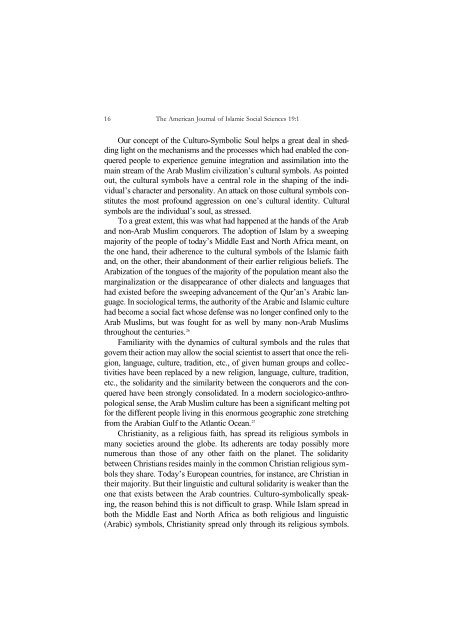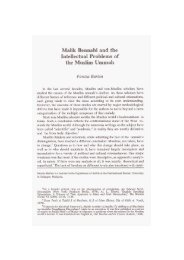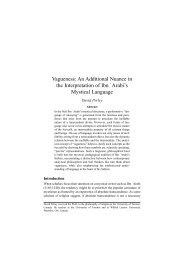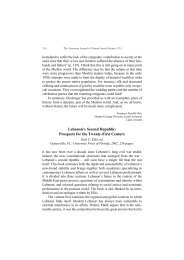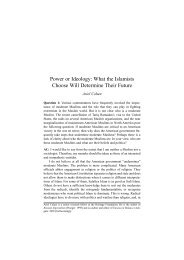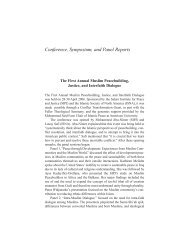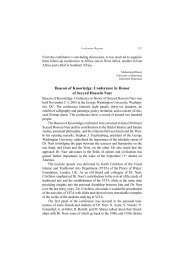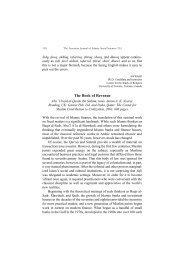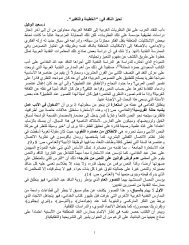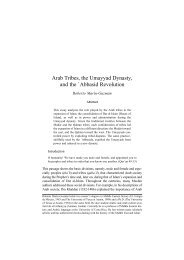Social Science's Need for a Cultural Symbols ... - Epistemology
Social Science's Need for a Cultural Symbols ... - Epistemology
Social Science's Need for a Cultural Symbols ... - Epistemology
You also want an ePaper? Increase the reach of your titles
YUMPU automatically turns print PDFs into web optimized ePapers that Google loves.
16 The American Journal of Islamic <strong>Social</strong> Sciences 19:1<br />
Our concept of the Culturo-Symbolic Soul helps a great deal in shedding<br />
light on the mechanisms and the processes which had enabled the conquered<br />
people to experience genuine integration and assimilation into the<br />
main stream of the Arab Muslim civilization’s cultural symbols. As pointed<br />
out, the cultural symbols have a central role in the shaping of the individual’s<br />
character and personality. An attack on those cultural symbols constitutes<br />
the most profound aggression on one’s cultural identity. <strong>Cultural</strong><br />
symbols are the individual’s soul, as stressed.<br />
To a great extent, this was what had happened at the hands of the Arab<br />
and non-Arab Muslim conquerors. The adoption of Islam by a sweeping<br />
majority of the people of today’s Middle East and North Africa meant, on<br />
the one hand, their adherence to the cultural symbols of the Islamic faith<br />
and, on the other, their abandonment of their earlier religious beliefs. The<br />
Arabization of the tongues of the majority of the population meant also the<br />
marginalization or the disappearance of other dialects and languages that<br />
had existed be<strong>for</strong>e the sweeping advancement of the Qur’an’s Arabic language.<br />
In sociological terms, the authority of the Arabic and Islamic culture<br />
had become a social fact whose defense was no longer confined only to the<br />
Arab Muslims, but was fought <strong>for</strong> as well by many non-Arab Muslims<br />
throughout the centuries. 26<br />
Familiarity with the dynamics of cultural symbols and the rules that<br />
govern their action may allow the social scientist to assert that once the religion,<br />
language, culture, tradition, etc., of given human groups and collectivities<br />
have been replaced by a new religion, language, culture, tradition,<br />
etc., the solidarity and the similarity between the conquerors and the conquered<br />
have been strongly consolidated. In a modern sociologico-anthropological<br />
sense, the Arab Muslim culture has been a significant melting pot<br />
<strong>for</strong> the different people living in this enormous geographic zone stretching<br />
from the Arabian Gulf to the Atlantic Ocean. 27<br />
Christianity, as a religious faith, has spread its religious symbols in<br />
many societies around the globe. Its adherents are today possibly more<br />
numerous than those of any other faith on the planet. The solidarity<br />
between Christians resides mainly in the common Christian religious symbols<br />
they share. Today’s European countries, <strong>for</strong> instance, are Christian in<br />
their majority. But their linguistic and cultural solidarity is weaker than the<br />
one that exists between the Arab countries. Culturo-symbolically speaking,<br />
the reason behind this is not difficult to grasp. While Islam spread in<br />
both the Middle East and North Africa as both religious and linguistic<br />
(Arabic) symbols, Christianity spread only through its religious symbols.


